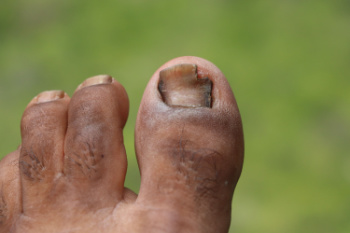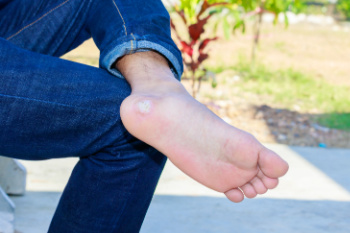Connect With Us
Blog

Athlete’s foot is a fungal infection that causes itching, redness, and peeling, usually between the toes or on the soles. Most cases respond well to mild antifungal creams, sprays, or powders. However, if symptoms continue for weeks or return often, the infection may be more serious or resistant to treatment. In some cases, what looks like athlete’s foot may be another condition, such as eczema or psoriasis, and needs a different approach. Poor foot hygiene, wearing tight shoes, and damp environments can also make healing harder. A podiatrist can confirm the diagnosis through a simple test and may prescribe stronger medications or check for other skin problems. Early attention can prevent the infection from spreading or becoming chronic. If you have athlete’s foot that does not improve, it is suggested that you see a podiatrist for a proper diagnosis and appropriate treatment.
Athlete’s foot is an inconvenient condition that can be easily reduced with the proper treatment. If you have any concerns about your feet and ankles, contact one of our podiatrists from David A. Scalzo, DPM, PC and Associates. Our doctors will treat your foot and ankle needs.
Athlete’s Foot: The Sole Story
Athlete's foot, also known as tinea pedis, can be an extremely contagious foot infection. It is commonly contracted in public changing areas and bathrooms, dormitory style living quarters, around locker rooms and public swimming pools, or anywhere your feet often come into contact with other people.
Solutions to Combat Athlete’s Foot
- Hydrate your feet by using lotion
- Exfoliate
- Buff off nails
- Use of anti-fungal products
- Examine your feet and visit your doctor if any suspicious blisters or cuts develop
Athlete’s foot can cause many irritating symptoms such as dry and flaking skin, itching, and redness. Some more severe symptoms can include bleeding and cracked skin, intense itching and burning, and even pain when walking. In the worst cases, Athlete’s foot can cause blistering as well. Speak to your podiatrist for a better understanding of the different causes of Athlete’s foot, as well as help in determining which treatment options are best for you.
If you have any questions please feel free to contact our offices located in Duryea and Bangor, PA . We offer the newest diagnostic and treatment technologies for all your foot and ankle needs.

Athletes are more likely to develop onychomycosis, a fungal infection of the toenails. Constant sweating, wearing tight shoes, and exposure to communal areas like locker rooms create an ideal environment for fungus to thrive. Repetitive trauma to the toenails from running or sporting activity can also make nails more vulnerable to infection. Early signs include discoloration, thickening, and crumbling of the nail. If left untreated, onychomycosis can cause pain, make wearing shoes difficult, and even lead to secondary bacterial infections. Treatment often involves topical antifungal medications, oral prescriptions, or laser therapy. Athletes can help prevent onychomycosis by keeping their feet clean and dry, changing socks regularly, wearing breathable shoes, and using shower shoes in public areas. If you notice changes in your toenails, it is suggested that you see a podiatrist for diagnosis and appropriate treatment.
If left untreated, toenail fungus may spread to other toenails, skin, or even fingernails. If you suspect you have toenail fungus it is important to seek treatment right away. For more information about treatment, contact one of our podiatrists of David A. Scalzo, DPM, PC and Associates. Our doctors can provide the care you need to keep you pain-free and on your feet.
Symptoms
- Warped or oddly shaped nails
- Yellowish nails
- Loose/separated nail
- Buildup of bits and pieces of nail fragments under the nail
- Brittle, broken, thickened nail
Treatment
If self-care strategies and over-the-counter medications does not help your fungus, your podiatrist may give you a prescription drug instead. Even if you find relief from your toenail fungus symptoms, you may experience a repeat infection in the future.
Prevention
In order to prevent getting toenail fungus in the future, you should always make sure to wash your feet with soap and water. After washing, it is important to dry your feet thoroughly especially in between the toes. When trimming your toenails, be sure to trim straight across instead of in a rounded shape. It is crucial not to cover up discolored nails with nail polish because that will prevent your nail from being able to “breathe”.
In some cases, surgical procedure may be needed to remove the toenail fungus. Consult with your podiatrist about the best treatment options for your case of toenail fungus.
If you have any questions, please feel free to contact our offices located in Duryea and Bangor, PA . We offer the newest diagnostic and treatment technologies for all your foot care needs.

Plantar warts are small growths that develop on the soles of your feet. They are caused by the human papillomavirus, or HPV, which enters the skin through tiny cuts or breaks in the skin. While often harmless, plantar warts can become painful, especially when located on weight-bearing areas like the heel or ball of the foot. Walking can feel like you’re stepping on a pebble, and over time, the pressure may cause the wart to grow inward beneath thick layers of skin. Mild treatments do not always work and can take months to show results. A podiatrist offers more effective options, including cryotherapy, or freezing, as well as topical acids, or minor surgical removal. Early treatment not only relieves discomfort but also helps prevent the wart from spreading to other areas or people. If you suspect you have a plantar wart and it is not improving, it is suggested that you schedule an appointment with a podiatrist for proper diagnosis and appropriate treatment.
Plantar warts can be very uncomfortable. If you need your feet checked, contact one of our podiatrists from David A. Scalzo, DPM, PC and Associates. Our doctors will assist you with all of your foot and ankle needs.
About Plantar Warts
Plantar warts are the result of HPV, or human papillomavirus, getting into open wounds on the feet. They are mostly found on the heels or balls of the feet.
While plantar warts are generally harmless, those experiencing excessive pain or those suffering from diabetes or a compromised immune system require immediate medical care. Plantar warts are easily diagnosed, usually through scraping off a bit of rough skin or by getting a biopsy.
Symptoms
- Lesions on the bottom of your feet, usually rough and grainy
- Hard or thick callused spots
- Wart seeds, which are small clotted blood vessels that look like little black spots
- Pain, discomfort, or tenderness of your feet when walking or standing
Treatment
- Freezing
- Electric tool removal
- Laser Treatment
- Topical Creams (prescription only)
- Over-the-counter medications
To help prevent developing plantar warts, avoid walking barefoot over abrasive surfaces that can cause cuts or wounds for HPV to get into. Avoiding direct contact with other warts, as well as not picking or rubbing existing warts, can help prevent the further spread of plantar warts. However, if you think you have developed plantar warts, speak to your podiatrist. He or she can diagnose the warts on your feet and recommend the appropriate treatment options.
If you have any questions please feel free to contact our offices located in Duryea and Bangor, PA . We offer the newest diagnostic and treatment technologies for all your foot and ankle needs.
Blog Archives
- April 2025
- March 2025
- February 2025
- January 2025
- December 2024
- November 2024
- October 2024
- September 2024
- August 2024
- July 2024
- June 2024
- May 2024
- April 2024
- March 2024
- February 2024
- January 2024
- December 2023
- November 2023
- October 2023
- September 2023
- August 2023
- July 2023
- June 2023
- May 2023
- April 2023
- March 2023
- February 2023
- January 2023
- December 2022
- November 2022
- October 2022
- September 2022
- August 2022
- July 2022

